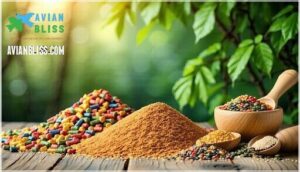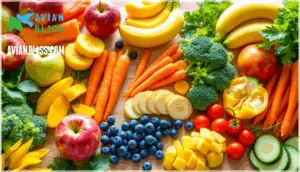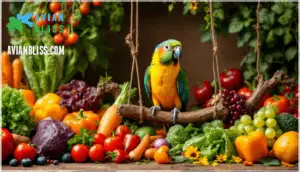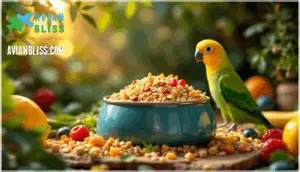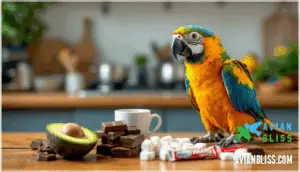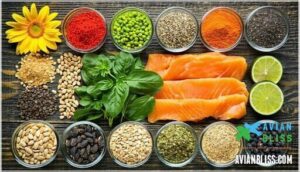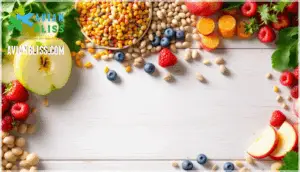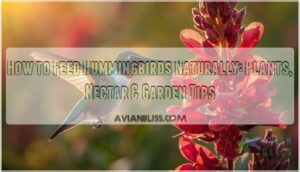This site is supported by our readers. We may earn a commission, at no cost to you, if you purchase through links.
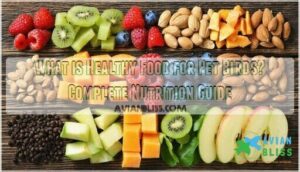
Proper avian nutrition isn’t about guesswork or tradition—it’s about understanding what your feathered companion actually needs to thrive. This guide breaks down the essentials of bird nutrition, from protein and vitamins to the role of fresh foods, so you can make informed choices that keep your pet healthy for years to come.
Table Of Contents
- Key Takeaways
- What is Healthy Food for Pet Birds?
- Seeds, Pellets, and Formulated Diets
- Fresh Fruits, Vegetables, and Whole Grains
- Protein, Fats, and Dietary Supplements
- Feeding Guidelines and Healthy Treats
- Frequently Asked Questions (FAQs)
- What is the healthiest food for birds?
- What is the best thing to feed birds?
- What is the best natural bird food?
- What foods should birds not eat?
- How often should I feed my bird treats?
- Can birds eat rice or pasta safely?
- What should I avoid if my bird is molting?
- How to transition a bird to a new diet?
- What kind of toys promote active eating?
- Can birds eat the same fruits humans do?
- Conclusion
Key Takeaways
- A healthy bird diet starts with high-quality pellets or formulated foods, not just seeds, to cover all essential nutrients.
- Fresh fruits, vegetables, and whole grains add important vitamins, minerals, and fiber, making meals more interesting and nutritious.
- Avoid toxic foods like avocado, chocolate, and caffeine, and always wash produce to prevent pesticide exposure.
- Regular vet checkups and careful portion control help catch nutrition problems early and keep your bird thriving.
What is Healthy Food for Pet Birds?
Feeding your bird well means more than just filling the bowl each day. The right mix of nutrients keeps feathers bright, energy steady, and health strong for years to come.
Let’s look at what your bird really needs, why variety matters, and the mistakes that trip up even caring owners.
Key Nutritional Requirements for Birds
Your bird’s body runs on six essential building blocks: protein, vitamins, minerals, carbohydrates, fats, and water. Protein sources supply amino acids for feathers and muscles, while vitamin deficiencies—especially A and D3—can trigger respiratory trouble and weak bones. Calcium intake promotes skeletal health, and fiber benefits digestion when you offer fruits and vegetables. Fatty acids, particularly omega-3s, keep feathers glossy and brains sharp.
Meeting these avian dietary requirements through nutritional balance prevents disease and ensures your feathered friend thrives for years to come. Birds require precise bird nutrition for peak health and longevity.
Role of Variety in Avian Diets
Just like you wouldn’t thrive on pizza every single night, your bird can’t stay healthy nibbling the same handful of seeds day after day. Dietary enrichment offers nutritional synergy—different foods work together so vitamins and minerals absorb better.
Mixing fresh foods for birds, like colorful fruits and vegetables, also creates foraging opportunities that satisfy taste preferences and deliver behavioral benefits, keeping your pet mentally sharp while meeting avian dietary requirements for true nutritional balance.
Common Feeding Mistakes to Avoid
Even the most well-meaning bird owner can accidentally serve up a diet that does more harm than good. Here’s what to watch for:
- Seed-only diets starve your bird of vitamin A and calcium, opening the door to respiratory disease and weak bones.
- Overfeeding treats without variety throws off nutritional balance and can lead to obesity.
- Ignoring hydration or offering unsafe foods—even toxic substances—puts your pet at serious risk.
Follow feeding guidelines and seek veterinary guidance to keep food safety and nutritional intake on track.
Seeds, Pellets, and Formulated Diets
You might’ve heard that seeds are the go-to food for birds, but that old-school approach can lead to serious health problems down the road.
The base of your bird’s diet—whether seeds, pellets, or a formulated mix—makes all the difference in their long-term health.
Let’s break down what really works and how to make the switch if your bird needs it.
The Truth About All-Seed Diets
You might think seeds are perfect because your bird goes crazy for them—but here’s the reality: seed-only diets come with serious health risks that can shorten your feathered friend’s life. A seed-only diet is insufficient because it doesn’t meet a parrot’s essential nutritional needs.
| Problem | What Happens |
|---|---|
| Excess Fat Content | Sunflower seeds pack about 49% fat—three times more than chocolate. This leads to obesity and fatty liver disease. |
| Nutritional Deficiencies | Seed diets lack calcium, vitamin A, zinc, and essential amino acids. Over 80% of birds eating mostly seeds don’t get enough protein. |
| Chemical Exposure | Non-organic seeds often contain pesticide residues that cause respiratory irritation and liver damage. |
| Behavioral Issues | Selective eating from seed mixes worsens nutrient gaps, and seed-based diets are linked to feather picking and low activity levels. |
Despite what seed mix labels promise, these products aren’t complete feeds. Your bird discards the vitamin-coated hulls anyway, so fortification does little good. Birds on seed-only diets show consistent weight gain—one study documented a 6.1% increase—and face higher risks of heart disease, diabetes, and weakened immunity. Thousands of pet birds die annually from malnutrition caused by all-seed diets.
Seed-only diets cause weight gain, disease, and malnutrition, leading thousands of pet birds to early death each year
Benefits of Pellets and Formulated Foods
Pellets are a major improvement for your bird’s health. These complete feeds deliver balanced nutrition in every bite, stopping selective eating cold.
You’ll see improved longevity—some birds live 5-10 years longer on pellets. Nutrient absorption jumps to over 85%, and waste reduction reaches 80% compared to seed mixes.
High-quality pellet diets also mean cost savings: no extra supplements needed.
Transitioning to a Balanced Base Diet
Switching your bird from seeds to pellets doesn’t happen overnight, but with patience and a few smart tricks, you’ll get there without the drama. Start with a gradual introduction—mix a small amount of high-quality pellet like Harrison’s or Roudybush into the seed bowl, slowly increasing pellet ratios over 4-6 weeks.
Expect weaning challenges and behavioral changes, but stay consistent. Most birds accept parrot pellets once they realize it’s their new normal.
Fresh Fruits, Vegetables, and Whole Grains
Fresh produce and whole grains turn a basic bird diet into something truly nourishing. You’ll want to know which fruits and veggies are safe, how colors indicate different nutrients, and which grains pack the most punch.
Let’s look at what you can confidently add to your bird’s bowl—and what should never make it near the cage.
Safe Fruits and Vegetables for Birds
You’ll want to start with fresh fruits and raw vegetables that are safe and nutritious. Apples (seeds removed), bananas, mangoes, and berries all make excellent fruit choices. For vegetables, try carrots, broccoli, bell peppers, and zucchini.
Wash all produce thoroughly to remove pesticides—organic options are ideal for your bird’s sensitive system. Cut portions to match your bird’s beak size for easier eating and foraging enrichment.
Grouping Veggies by Color and Nutrient
Think of colorful vegetables as nature’s own supplement aisle—each hue delivers a unique set of vitamins and minerals
Whole Grains and Legumes as Healthy Additions
Whole grains and legumes aren’t just for health-conscious humans—they’re powerhouse foods that can boost your bird’s energy and support healthy digestion. Cooked brown rice, quinoa, oats, and sprouted lentils offer fiber and B vitamins that complement pellets and fresh foods beautifully.
Sprouting legumes increases their nutritional value and makes them easier for your bird to digest, though portion control matters—grains should stay around 10–15% of the overall diet to maintain balance.
Foods to Avoid and Toxic Substances
Not every food that seems harmless to us is safe for your feathered friend—in fact, some common kitchen staples can be downright dangerous. Avocado toxicity can cause heart failure, while chocolate dangers and caffeine effects trigger seizures and cardiac issues. Xylitol risks include liver damage, and heavy metals from certain cookware or treated woods pose serious threats.
When you’re uncertain about toxic foods and substances, food safety and storage become important—your veterinary guidance and recommendations can help you avoid harmful foods and protect your bird from hidden toxic substances.
Protein, Fats, and Dietary Supplements
Your bird needs more than just pellets and veggies to thrive—protein, healthy fats, and the occasional supplement round out a truly balanced diet.
Getting the mix right isn’t complicated, but it does require knowing what sources work best and when to add a little extra support.
Let’s break down how to give your feathered friend the building blocks for strong muscles, shiny feathers, and long-term health.
Animal Vs. Plant Protein Sources
When you’re choosing proteins for your bird’s diet, understanding the difference between animal and plant sources can feel like cracking a code—but it’s simpler than you think. Animal proteins offer over 90% digestibility and complete amino profiles, while plant proteins usually reach only 60% utilization without supplementation. Here’s what matters most for your feathered friend’s nutrition:
- Protein digestibility is higher in animal sources like cooked eggs, lean meats, and insects than in seeds or legumes
- Amino profiles from animal proteins provide essential lysine, methionine, and threonine needed for feather health
- Breeding impacts become significant when protein levels drop, potentially causing nest abandonment during critical seasons
- Insect proteins, especially black soldier fly larvae, combine excellent digestibility with high calcium content
- Dietary risks emerge when seed-only diets create deficiencies in key amino acids and immune function
Balanced bird nutrition requires mixing both protein types, particularly during growth or breeding phases.
Importance of Healthy Fats and Omega-3s
While protein builds muscle and feathers, fats fuel your bird’s energy needs and keep everything from brain function to plumage looking sharp. Omega-3 sources like flax, chia, and walnuts support avian diet quality, while excessive seed fat content—often over 30%—can trigger lipidosis prevention concerns. Balancing PUFA consumption with formulated foods creates proper nutritional balance for your bird’s dietary needs.
| Fatty Acid Benefits | Best Omega-3 Sources |
|---|---|
| Brain health & immunity | Flaxseed, chia seeds |
| Feather quality & shine | Walnuts, hemp hearts |
| Inflammation reduction | Leafy greens, supplements |
When Supplements May Be Needed
Even the best diet sometimes needs a boost. Deficiency correction helps birds on seed-only diets overcome gaps in vitamins A, D3, and calcium—up to 70% of these birds need extra support.
Stress support during molting or illness, breeding support for egg-laying females, and filling diet gaps in limited diets all call for dietary supplements. Nekton-S and similar nutrition supplements provide targeted help, but risks monitoring matters—over-supplementation causes toxicity.
Always follow veterinary recommendations and store supplements properly to maintain potency.
Consulting an Avian Veterinarian
Your bird’s health can change faster than you think, so partnering with an avian vet who knows your feathered friend’s baseline is one of the smartest moves you’ll make. They’ll provide dietary analysis, catch health issues early through monitoring, and offer preventative measures specific to your bird’s species and lifestyle.
- Annual wellness exams track weight, feather quality, and nutritional deficiencies
- Dietary analysis identifies gaps in vitamins, minerals, and protein balance
- Emergency care for sudden illness, injury, or suspected poisoning
- Species-specific advice on portion sizes, feeding schedules, and safe foods
- Behavioral assessments link diet changes to mood, activity, and overall avian wellness
Feeding Guidelines and Healthy Treats
Getting the portions right and knowing what treats are safe makes all the difference in keeping your bird healthy and happy. You’ll want to establish a feeding routine that covers meal frequency, portion sizes, and smart snacking options.
Let’s walk through the practical guidelines that’ll help you create a balanced daily routine for your feathered friend.
How Often and How Much to Feed
Think of feeding your bird like keeping a schedule—consistency matters. Adult birds do best with food twice daily, morning and evening, roughly twelve hours apart, while keeping formulated pellets available throughout the day fosters healthy feeding habits.
For juveniles, feeding frequency depends on age: newly hatched chicks need feeding every two to three hours, while fledglings require just two to three meals daily. Portion control is key—baby birds generally eat about twelve percent of their body weight per feeding, and you’ll want to monitor weight daily with a gram scale to promote proper nutritional balance and intake.
Adjust dietary requirements based on activity levels, seasonal changes, or life events like molting. Always provide fresh water and watch hydration monitoring closely, since droppings can tell you a lot about feeding guidelines and strategies.
Healthy Homemade Treat Ideas
Whipping up homemade treats for your feathered friend doesn’t require fancy ingredients—just a bit of creativity and some bird-safe staples from your own kitchen. Try baking bird treats with mashed sweet potato, oats, and chopped nuts and seeds, or thread fresh fruits and vegetables onto skewers for foraging enrichment.
Add safe ingredients like fresh parsley or a pinch of cinnamon—herbs and spices your bird will love. Keep treat portion control in mind; these goodies should stay occasional rewards, not meal replacements.
Hydration and Water Requirements
Just like you wouldn’t skip your morning coffee, your bird can’t go without fresh, clean water—it’s essential for everything from digestion to keeping feathers in top shape. Change your bird’s water at least twice daily, because stale water invites bacteria.
Species variations matter—pigeons, for example, drink about 1.6 times their food intake by weight. Bathing habits also support hydration and feather health, so offer a shallow dish for splashing.
Monitoring Your Bird’s Health Through Diet
A bird’s body tells the real story—weight fluctuations, feather condition, droppings, and energy levels can all signal whether your diet plan is hitting the mark or missing it entirely.
Track appetite changes weekly and watch for dull plumage or abnormal droppings, both red flags for poor bird nutrition and diet.
If activity levels drop or bird behavior shifts, consult an avian veterinarian—early detection of bird health issues keeps your feathered friend thriving.
Frequently Asked Questions (FAQs)
What is the healthiest food for birds?
The healthiest food combines high-quality pellets or formulated diets with fresh vegetables, fruits, and whole grains.
Best birdseed alone won’t cut it—balanced bird diets need variety.
Reading labels helps you choose avian superfoods that support pet bird nutrition and overall health.
What is the best thing to feed birds?
For ideal bird food, aim for a balanced diet that includes pellets, seeds, fresh fruits, vegetables, and healthy snacks for birds.
Bird food variety and protein sources help avoid deficiencies, supporting pet bird nutrition and overall health.
What is the best natural bird food?
If you want a feast fit for royalty, the best natural bird food blends fresh fruits and raw vegetables, sprouted seeds, whole grains, nuts, and organic options—mirroring wild bird diets and encouraging foraging enrichment with sustainable sourcing.
What foods should birds not eat?
Toxic foods like avocado, chocolate, caffeine, and alcohol are dangerous for birds. Avoid processed foods, high-fat seeds, and sugary treats.
Careful food safety and care are your responsibility—steer clear of harmful substances to keep your pet healthy.
How often should I feed my bird treats?
Ever wondered if treat timing matters for Pet Bird Care and Health?
For Avian Wellness and Behavior, offer treats sparingly—two to three times weekly. Focus on treat portion sizes and nutritional value, especially during training with treats.
Can birds eat rice or pasta safely?
Yes, birds can eat cooked rice and plain pasta in moderation. Stick to whole grain options for better nutritional value. Always serve small, safe portions, and avoid added salt or sauces to support Pet Bird Care and Health.
What should I avoid if my bird is molting?
As the saying goes, “an ounce of prevention is worth a pound of cure.” During molting, avoid fatty treats, processed foods, and toxic foods and substances.
Focus on hydration importance, nutrient intake, and feather development support for bird health.
How to transition a bird to a new diet?
Start with a gradual introduction of new pet bird food, blending it with the old. Pay attention to texture preferences and behavioral challenges. Use feeding techniques, monitor weight, and seek veterinary guidance for avian diet planning and dietary balance.
What kind of toys promote active eating?
Just like treasure hunts spark curiosity, foraging toys, puzzle feeders, treat balls, edible toys, and DIY options encourage active eating.
These boost bird behavior, support bird health, and make bird feeding more engaging for your pet bird.
Can birds eat the same fruits humans do?
Birds can enjoy many of the same fruits humans eat, but fruit safety depends on toxicity levels and preparation methods.
Always check which fruits are safe, watch serving sizes, and avoid pits or seeds—especially in parrot diets.
Conclusion
Can you picture your bird thriving—active, vibrant, and showing off glossy feathers? That vision starts with understanding what’s the healthy food for pet birds.
When you offer a blend of fresh produce, balanced pellets, and occasional treats, you’re not just filling a bowl; you’re investing in your bird’s long-term well-being. Every meal is an opportunity to nurture their spirit and health. With each thoughtful choice, you become the hero in your bird’s daily story.
- https://lafeber.com/vet/the-nutritional-content-of-pet-bird-diets/
- https://pubmed.ncbi.nlm.nih.gov/15787998/
- https://www.cabidigitallibrary.org/doi/pdf/10.5555/20210293798
- https://vetmed.tamu.edu/files/vetmed/macaw/publications/Veterinary-Research/brightsmith_2012_captive_amazona_diets.pdf
- https://bestfriends.org/pet-care-resources/best-parrot-diet-and-toxic-foods-avoid

